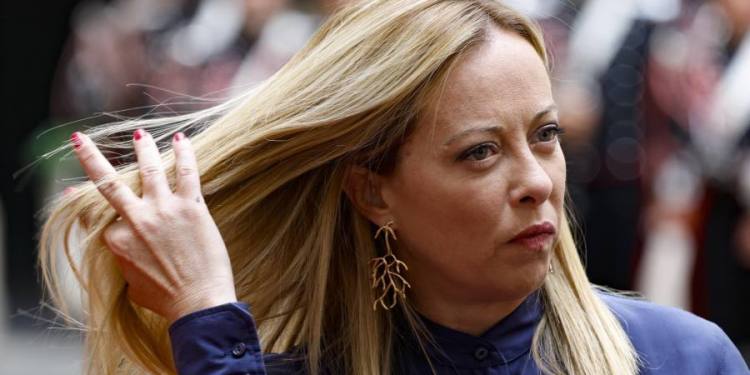Receive free Italian politics updates
We’ll send you a myFT Daily Digest email rounding up the latest Italian politics news every morning.
This article is an on-site version of our Europe Express newsletter. Sign up here to get the newsletter sent straight to your inbox every weekday and Saturday morning
Good morning. Today, our Rome bureau chief previews the visit of Italy’s leader to the White House, where her stance towards China is likely to be quizzed by a president with a soft spot for his guest. And it’s ECB day: Our man in Frankfurt explains why the eurozone’s central bank wants to keep investors in the dark as much as possible.
Fast friends
US president Joe Biden and Italian prime minister Giorgia Meloni have hit it off during their three encounters since Meloni took office last year, as a snapshot of the two walking hand-in-hand at May’s G7 summit in Hiroshima attests.
The two leaders are set to deepen their relationship during today’s visit by Meloni to the White House to discuss geostrategic issues, including Rome’s fraught relationship with China, writes Amy Kazmin.
Context: Italy and the US are longstanding Nato allies. Washington was dismayed when Rome in 2019 joined China’s controversial Belt and Road Initiative. Meloni must decide by the end of this year whether to allow the deal to renew, or risk Beijing’s ire by formally withdrawing.
Meloni has previously called it a mistake for Rome to join the programme. Though she has publicly claimed she is still evaluating her options, Italian officials say she plans to withdraw — in a manner that provokes the least retaliation from Beijing.
Meloni is expected to discuss her approach to extricating Italy from the programme with Biden, as Washington seeks reassurances about Italy’s position on China ahead of Rome’s assumption of the G7 presidency in 2024.
“The Americans want to be sure that Italy is on board with China,” said a senior Italian official. “The issue is, will the Italian G7 presidency be able to adopt harsh language on China, if need be? . . . Or are the Chinese still able to pollute the waters in Italy?”
China isn’t the only item on the agenda. The two sides will discuss the conflict in Ukraine, where the leaders see eye to eye on the need to support Kyiv in its fight against Russia.
Meloni is also likely to call for the US to engage more deeply with Africa, where she sees socio-economic development as crucial to both global security and stopping the flow of migrants to Italy and Europe.
“There has to be a new attitude to Africa,” the Italian official said. “We can’t allow [Africans] to see us as former colonial powers, and China and Russia as the new guys helping them out.”
Chart du jour: Still high
The July figures for eurozone inflation will be released next week. But even if inflation drops from 5.5 per cent in June, it still has a long way to fall before reaching the European Central Bank’s 2 per cent target, something it does not expect until 2025. It also worries that rising wages and resilient demand for services could keep it higher for longer.
Keep ‘em guessing
Investors like to bet on what will happen next. Christine Lagarde knows this. So when the ECB president announces its latest interest rate increase today, she is likely to keep the door open for further rises, even if it is getting close to stopping, writes Martin Arnold.
Context: The ECB has raised rates by an unprecedented 4 percentage points to tackle soaring inflation in the past year and has signalled that it is likely to raise rates by another quarter point after its meeting today. But there are doubts over how much higher borrowing costs will go.
Recent survey data indicates the recent downturn in the eurozone economy is deepening. This suggests the ECB’s tighter monetary policy is working and points to a further decline in inflation.
Economists say the ECB is likely to keep investors guessing for as long as possible about when rate rises will stop, to avoid them betting on cuts in borrowing costs that would loosen financial conditions and risk a rebound in inflation.
Barclays’ chief European economist Silvia Ardagna thinks this month will be the ECB’s final rate rise. But she also said it would be “prudent and wiser to leave the door open to potential future hikes”.
Last month, Lagarde signalled she was thinking along these lines by saying it was “unlikely that in the near future the central bank will be able to state with full confidence that the peak rates have been reached”.
Martin Wolburg, senior economist at Generali Investments Europe, agrees the strategy of keeping investors in the dark is the right approach. “By maintaining a hawkish communication they just let the expectation effect work even after the soon-to-be-reached peak rate level,” he said.
What to watch today
-
St Petersburg hosts the second Russia-Africa summit and economic forum.
-
EU health ministers meet in Las Palmas, Spain.
Now read these
Are you enjoying Europe Express? Sign up here to have it delivered straight to your inbox every workday at 7am CET and on Saturdays at noon CET. Do tell us what you think, we love to hear from you: [email protected]. Keep up with the latest European stories @FT Europe


![https://primexbt.investments/start_trading/?cxd=459_549985&pid=459&promo=[afp7]&type=IB](https://tradinghow.com/wp-content/uploads/2025/02/primexbt-markets-e1738588646201.jpg)
![https://primexbt.investments/start_trading/?cxd=459_549985&pid=459&promo=[afp7]&type=IB](https://tradinghow.com/wp-content/uploads/2025/02/primexbt-markets.jpg)
![https://primexbt.investments/start_trading/?cxd=459_549985&pid=459&promo=[afp7]&type=IB](https://tradinghow.com/wp-content/uploads/2025/02/PrimeXBT-Trading.jpg)












